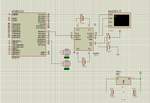esh123456
Newbie level 3

I am driving 2 RC servo motors simultaneously in my robot.I am using atmega32 at 14.7456MHZ frequency. there are no errors when i connect one servo to atmega32, but when two servos connected to MCU, the motors rotate erratic. Can anyone give me suggestion?
excuse me if there is any error in my post, my language isn't English.
excuse me if there is any error in my post, my language isn't English.


